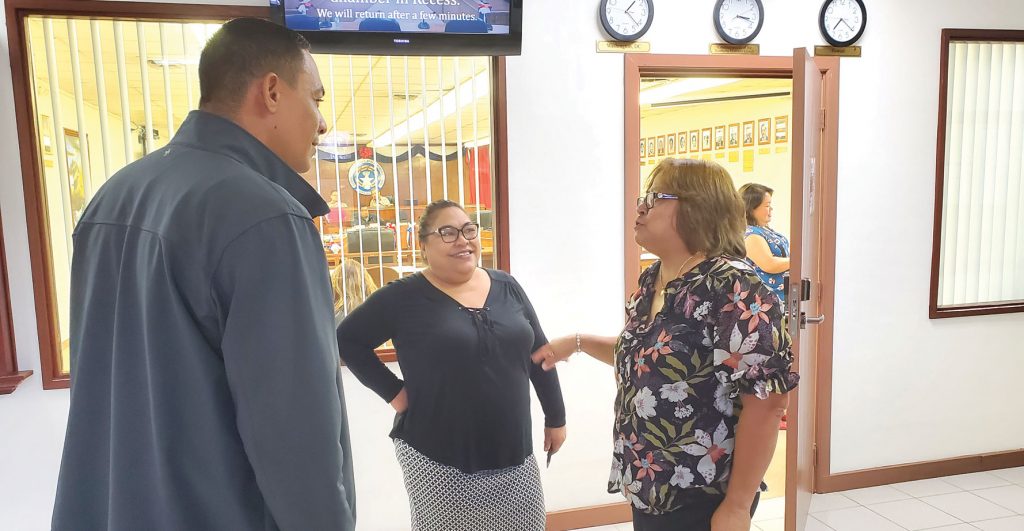CHCC offer to pay CUC $225K/month rejected
Muña says CUC is bullying, using scare tactics; if disconnected Thursday, CHCC to buy 2nd generator

Sen. Dennis James C. Mendiola (R-Rota), left, and Commonwealth Utilities Corp. board of directors chair Janice A. Tenorio, center, listen to Commonwealth Healthcare Corp. chief executive officer Esther L. Muña during a break in the meeting between the Senate Health, Education, and Welfare Committee and Senate Public Utilities, Transportation, and Communications, Friday afternoon. (FERDIE DE LA TORRE)
The Commonwealth Utilities Corp. board of directors has rejected the Commonwealth Healthcare Corp.’s proposal to pay $225,000 monthly for utility services, saying the plan is not sustainable.
CUC board chair Janice A. Tenorio informed CHCC chief executive officer Esther L. Muña in a letter Thursday that they both know that the offer is quite short of the average monthly billing for CHCC’s utility consumption.
Including CHCC’s $200,000 monthly average electricity billing, CHCC’s total monthly average billings for all services is $500,000. According to CUC, CHCC’s unpaid arrears for power, water, and wastewater services have now reached $53.6 million as of March 31, 2023.
Tenorio told Muña that, while Muña shares the challenges and problems with the CHCC’s cash flow collections and the timing of federal reimbursements with CUC’s board at their meeting that day, the outstanding arrears remains CHCC’s obligation.
At the Senate joint meeting Friday between the Health, Education, and Welfare Committee, and Public Utilities, Transportation, and Communications Committee, Muña disclosed that, after their meeting with CUC on Thursday, CUC will still press ahead with disconnecting the hospital by May 4, 2023.
Muña said that CUC is asking for a monthly payment of $500,000 plus $225,000—for a total of $725,000 each month.
She said they did offer CUC that if the $225,000 is low, at the end of the year, they will look at basically what they are settling with Medicaid and make the adjustment and pay the difference, based on their usage versus what they’re paying.
Right now, CHCC has a backup generator as a power source, Muña said, and if CUC disconnects them, they will need to get a second backup generator. She said that would mean that they won’t be able to pay CUC the $225,000 monthly because they will be using that money for fuel.
“What happens to the community then? It’s because it will go back to the community. Then all of us will be paying for that loss of revenue from CHCC. We are a big customer,” Muña said.
She disclosed that they are actually in the process of purchasing a second backup generator. “If they are disconnecting us, our goal is to get off the grid,” Muña said.
Perlita Santos, who is CHCC’s chief financial officer, said they are proposing a monthly payment of $225,000 so to avoid disconnection. That amount only covers the current electricity billings and not their arrears, she said.
Santos said they have yet come up with any proposal as to how they will address the arrears pending any action by the Legislature.
Santos said at this moment they are trying to do rate adjustment to Medicaid to recover the cost of their vendors.
“We choose to buy at the pharmaceuticals, which cost us about $360,000 weekly to be able to keep our patients getting treatment and the medication they need,” Santos said.
Santos said that CHCC is being billed right now at a commercial rate—which is more expensive—instead of government rate, and they are pleading to be billed at the government rate,
Kaitlyn Neises-Mocanu, who is chief strategy officer at CHCC, said their arrears is $54 million. Minus penalties, it’s just $32 million in principal.
In her letter to Muña, Tenorio said only CHCC can determine what is absolutely doable to resolve the arrears and its billings going forward.
CUC, on the other hand, Tenorio said, can no longer continue to service CHCC without full payment for services already rendered in good faith.
Thus, she said, to prevent interruption of utility services, CUC requires CHCC to pay its entire monthly bill in full each month beginning with the March 2023 billings, plus pay an additional $225,000 a month to retire its outstanding arrears. CHCC did remit $219,000 to CUC last April 19, Tenorio said, and the amount was applied against a portion of CHCC’s March 2023 bill.
Tenorio reminded Muña that, pursuant to CUC’s letter of notice of disconnection dated April 19, 2023, CHCC is still subject to disconnection if payments of the arrears are not made in full or if CHCC does not settle or agree to a payment plan before the May 4, 2023, disconnection date.
Muña told the HEW and PUTC Committees Friday that if they are to be disconnected, the most rational choice that ensures they continue to receive Medicare and Medicaid funding is to get off the CUC grid.
“This action will stop the bullying and scare tactics, and ensure that we meet certification and still provide quality care that our people deserve,” Muña said.
She said she cannot say “no” to patients requesting a $25,000 treatment a week because she must do the impossible and pay CUC—a government entity that the same government supports.
She said she cannot imagine what will happen when the Medicaid Presumptive Eligibility ends or when the funding for Medicaid is exhausted.
Muña said patients will be directed to CHCC—a safety net provider—because they can’t and won’t reject patients needing care.
“While we couldn’t pay over the years, the amount that we’re offering CUC results from working long hours together with Medicaid to adjust the reimbursement rate owed CHCC,” she said.
She said there is still much work ahead of them to achieve adequate reimbursement, but they’re not a unique hospital, since hospitals across the country also have challenges that jeopardize patient access to care and services. Muña said there are not enough caregivers, significant underpayment of Medicare and Medicaid is felt everywhere, and soaring costs of providing care.
She said they’re trying to stabilize their finances even with these factors by building local capacity and strengthening the health system to ensure a pipeline of healthcare workers.
Muna said that, while they will continue to lobby for parity with Medicaid funding, they must recognize that the rate they’re billed for goes beyond other healthcare providers.
“If CHCC is already [deemed incapable of paying] this exorbitant rate, why is there no room to negotiate, and why is there no room to fix it?” she asked.
Muna said they need the Legislature to help. She said if neither the CNMI nor CHCC have funds, then help change the rate for CHCC and remove the arrears of unfair rates.
Muna pointed out that an Office of the Public Auditor report 17-0 described the unpaid balance owed by government agencies to CUC as “an event created by a lack of historical appropriations by governors and the Legislature to support the Public School System and CHCC.
In December 2016, she said, the CNMI paid CHCC $7 million using Imperial Pacific International (CNMI) LLC’s Casino Community Benefit Fund, to help pay CUC.
In July 2020, Muña said, the government paid $2.5 million to CHCC from the American Rescue Plan Act funds but still disconnected CHCC beginning Sept. 8, 2020, despite CHCC being in the midst of responding to a public health emergency.
Nevertheless, Muña said, an agreement was executed between the CNMI government, CUC, and CHCC to pay $219,000 to CUC ($150,000 or more from the CNMI and $69,000 from CHCC). She said the Legislature also passed Public Law 20-11 and Public Law 18-71.
Public Law 20-11 requires public corporations and other autonomous agencies to pay 1% of their total operations for fiscal year 2019 to pay CHCC’s past due utility bills.
“None of these funds have been applied to CHCC’s debt to CUC,” Muña pointed out.
She said Public Law 18-71 appropriated $3.2 million to the outstanding debt of CHCC to CUC, which was not applied CHCC’s arrears either.
Muna said that, as they explained to CUC Thursday, if they are expected to continue to pay the government rate without government help and subsidy, then patient care will be affected.
“We will have to make even harder decisions that will result in CHCC losing certification and ultimately losing the largest payer source of Medicare and Medicaid, which…cannot be the option,” she said.
Acting CUC chief executive director Betty G. Terlaje said Muña’s statement that CUC is bullying and using scare tactics is largely overstated. She said CUC has been holding off disconnecting CHCC for many years or over a decade.
She said they did one-time disconnection in 2020 and that lasted only less than four hours because they immediately got to the table with them.
“Each time we put a number on the table or in communications with them, it doesn’t materialize quite well. And, frankly speaking, it’s hurting their state of affairs just as well because when they pay very little, their arrears still get higher and higher,” Terlaje said.



























